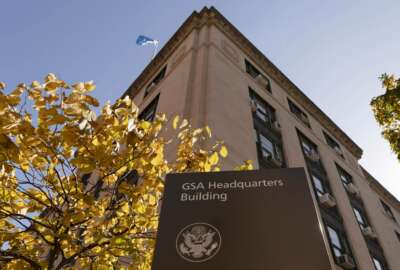IG: Water quality and mold may be issues when employees return to federal buildings
In today's Federal Newscast, you can add water issues at federal properties to the list of unforeseen consequences from the lockdown.
To listen to the Federal Newscast on your phone or mobile device, subscribe in PodcastOne or Apple Podcasts. The best listening experience on desktop can be found using Chrome, Firefox or Safari.
- Add water quality and mold to the challenges the General Services Administration will likely face in managing federal buildings in 2022. The GSA inspector general said reduced occupancy in federal buildings means fewer workers are flushing toilets and using water fountains, and that could lead to potential water quality degradation, including the growth of mold and lead and copper contamination. This is already on top of the steadily rising estimated costs of deferred maintenance to buildings, which is approximately $2.5 billion. The IG highlighted these and other ongoing issues as part of its annual management challenges report to Congress.
- The Department of Veterans Affairs needs more staff, leadership attention and tools to track the performance of its facilities. That’s the latest recommendation from the Government Accountability Office about VA’s aging real property portfolio. VA owns over 5,600 buildings and leases another 1,700 facilities. VA estimated it needs at least $22 million to correct maintenance problems at its facilities. But GAO said VA doesn’t have enough staff to manage its assets. That’s delayed projects and made it difficult for VA to manage ongoing initiatives. GAO also said VA lacks measurable goals for how building conditions should improve over time.
- The Department of Veterans Affairs is looking to artificial intelligence to improve patient care. The VA is testing whether artificial intelligence can assist clinicians in reviewing medical images, help veterans find services online and empower the agency to proactively reach out to patients about their mental health. The VA is adopting a new AI strategy that outlines how the agency can field this technology while protecting veterans sensitive data. Gil Alterovitz, director of the VA’s National AI Institute, said AI allows patients and clinicians to better understand the wealth of data that’s available to them. “It can basically increase the capacity of clinicians and patients to identify health conditions.” (Federal News Network)
- The Defense Department recently completed a classified review that will judge where future resources will be allotted. The Pentagon’s Global Posture Review is kept mostly under wraps in order to keep rivals guessing. However, the Defense Department did release a few details, mostly that it will be putting more resources in the Indo-Pacific region. That’s because the United States sees China as its main pacing threat. Those resources include greater regional access, more infrastructure in Australia and Pacific islands and planning more rotational aircraft deployments in the area. The review comes at a key inflection point as the military ends most of its large operations in the Middle East.
- Former Defense Secretary Mark Esper is suing the Pentagon, claiming officials are interfering with the publication of his upcoming memoir. The lawsuit, filed on Sunday, said Esper has been negotiating with DoD’s Office of Pre-publication and Security Review for nearly six months over details the Pentagon wants redacted from the book. Esper claims the manuscript never contained classified information in the first place, and that the redactions are a violation of his First Amendment rights. The lawsuit also insinuates Defense officials selectively leaked portions of the unpublished manuscript to media outlets. (Federal News Network)
- The Coast Guard took steps to hang onto its cybersecurity practitioners. Under authority from its parent agency, the Department of Homeland Security, the Coast Guard refreshes retention incentives. They apply to employees with unique or unusually high qualifications. Incentives can apply to individuals and groups at the discretion of supervisors. Depending on recipients’ cybersecurity certifications, retention incentives range from 10%-15% of basic pay. They’re not automatic. Supervisors need to submit evidence that people are about to leave.
- The Office of Naval Research hopes to reimagine how it approaches national security by teaming up with Stanford University. The office is creating a partnership with the Gordian Knot Center for National Security Innovation, which is dedicated to solving issues at the intersection of commercial technologies like artificial intelligence and instruments of national power. The Gordian Knot Center’s work continues a more than seven-decade partnership between ONR and Stanford.
- Defense Secretary Lloyd Austin said Oklahoma won’t get a pass on the military’s COVID vaccination mandate. The state’s governor had asked the Pentagon to exempt its National Guard from the vaccine requirement. And Oklahoma’s top Guard official issued his own policy saying his troops wouldn’t be penalized for refusing shots. In a letter to Oklahoma Gov. Kevin Stitt, Austin said all military members must follow the vaccine requirement, and failing to do so could “jeopardize” their status in the National Guard. (Federal News Network)
- The toughest punishments for unvaccinated federal employees will wait until after the holidays. The Biden administration is urging agencies to hold off on suspending or firing unvaccinated federal employees until January. Agencies should instead continue education and counseling initiatives. The administration said agencies might consider giving employees who continue to refuse vaccination a written reprimand for the time being. Ninety-two percent of federal employees are at least partially vaccinated. (Federal News Network)
- The Energy Department wants public input on how it can build resilient supply chains for the U.S. energy sector. In a new request for information, DOE laid out a wide ranging vision for securing energy supply chains. The department is asking for information on risks to specific sub-sectors, like solar, wind energy, hydropower, and nuclear energy. And it’s also investigating cross-cutting risks like cybersecurity and international competition. DOE is putting together a report due in late February as part of the Biden administration’s broader supply chain initiative.
- Customs and Border Protection is looking ahead toward a big IT procurement in 2022. Sometime next year, CBP said it will issue a formal request for proposals to bid on its cloud migration contract. In a notice to industry, the agency said it was continuing to refine its requirements for the “Enterprise Cloud and Integrated Services” acquisition. The agency has received plenty of feedback and interest in the big procurement since it first signaled it was going to migrate to the cloud in 2020. But it plans to do some additional market research through two new requests for information that have been released through the General Services Administration’s eBuy system.
- NITAAC’s perfect record of winning protests against its CIO-SP4 acquisition finally ended. After winning 22 straight protests, the NIH IT Acquisition Assessment Center finally lost before the Government Accountability Office. GAO partially sustained Computer World Services Corporation’s complaint that NITAAC didn’t treat bidders equally under the CIO-SP4 solicitation. CWS argued that NITAAC’s decision to limit the number of past performance examples to only two for large firms who are part of a joint venture was unreasonable and led to unequal treatment. GAO said NITAAC could not reasonably explain its rationale to limit only large business members of joint ventures versus limiting all members or teams. GAO, however, did deny two other complaints CWS filed as part of its protest.
- The Postal Service’s annual holiday gift drive is now accepting donations for the season. USPS through its Operation Santa program posts letters addressed to Santa Claus online, but redacts sensitive information like last names or addresses. Individuals who go through a short ID verification can select a letter and send a gift package through USPS. Individuals now have until Dec. 22 to go on the site and select a letter they’d like to fulfill. Packages can be shipped until Jan. 14. The Postal Service has run the program for longer than a century.
Copyright © 2024 Federal News Network. All rights reserved. This website is not intended for users located within the European Economic Area.
Eric White
Eric White is news anchor and Federal Drive producer at Federal News Network.
Follow @FEDERALNEWSCAST
Related Stories
GSA begins selling 11 high-value federal properties board deems underutilized
Related Topics
All News
bid protest
Coast Guard
COVID-19 vaccine mandate
Customs and Border Protection
Energy Department
Facilities/Construction
Federal Drive
Federal Newscast
General Services Administration
Government Accountability Office
Leasing/Property Management
Lloyd Austin
Management
Mark Esper
National AI Institutes
National Guard
NITAAC
Office of Naval Research
Pentagon
Postal Service
Supply chain management
Tom Temin
Water Contamination
Workforce






